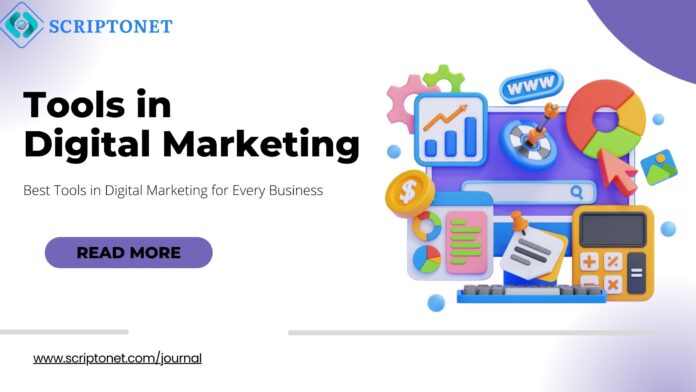Introduction
The use of online platforms to advertise and market goods and services to consumers and businesses is known as digital marketing. Tools in digital marketing include a range of digital channels, such as websites, social media, email, and search engines, to engage with its target audiences. This approach allows for precise targeting, measurable results & interactive engagement, offering a dynamic alternative to traditional marketing methods.
Essentially, digital marketing involves crafting & implementing strategies that utilize digital tools & technologies to build brand awareness, generate leads & drive sales. It’s about understanding customer behavior in the online sphere & adapting marketing efforts to meet their needs & preferences. This includes techniques like Search Engine Optimization (SEO), Content Marketing, Social Media Marketing (SMM) & Pay-Per-Click (PPC) Advertising, all working together to create a cohesive online presence & achieve marketing objectives.
Types of Digital Marketing Tools
Digital marketing tools can be categorized based on their primary function & the areas they serve within a digital marketing strategy. Some types are as below:
Content Marketing Tools
Content Marketing tools in digital marketing aid in the creation, management & distribution of valuable content. This category includes:
- Content Creation Platforms: Tools like Canva & Visme for graphic design, Lumen5 & Animoto for video creation & various blog editors (WordPress, Medium).
- Content Management Systems (CMS): Platforms like WordPress & Drupal for organizing & publishing website content.
- Content Distribution Tools: Social media scheduling tools (Hootsuite & Buffer) & email marketing platforms (Mailchimp) that help disseminate content.
- Content Analytics Tools: Google Analytics & similar platforms to track content performance & user engagement.
Search Engine Optimization (SEO) Tools
The visibility of a website in search engine results is enhanced by these tools. They include:
- Keyword Research Tools: Ahrefs & SEMrush to identify relevant keywords & analyze search trends.
- On-Page SEO Tools: Tools that analyze website content & structure for optimization opportunities.
- Backlink Analysis Tools: Tools to track & analyze backlinks, which are crucial for SEO.
- Website Audit Tools: Tools that scan websites for technical SEO issues.
Social Media Marketing Tools
These tools are used to manage & optimize social media presence. They include:
- Social Media Management Platforms: Sprout Social & AgoraPulse to schedule posts, manage interactions & track performance across multiple platforms.
- Social Listening Tools: Brandwatch & similar platforms to monitor brand mentions, track sentiment & identify trends.
- Social Media Analytics Tools: Platform-specific analytics (Facebook Insights) & third-party tools to measure engagement & reach.
- Social Media Advertising Tools: Tools for creating & managing paid social media campaigns.
Email Marketing Tools
These tools enable businesses to create, send & track email campaigns. This category includes:
- Email Marketing Platforms: Mailchimp & Convertkit to create email templates, automate sequences & segment lists.
- Email Automation Tools: Tools that automate email workflows based on user behavior & triggers.
- Email Analytics Tools: Tools that track open rates, click-through rates & other email metrics.
Conversion Rate Optimization (CRO) Tools
These tools help improve the percentage of website visitors who convert into customers. They include:
- Landing Page Builders: Leadpages & Unbounce to create high-converting landing pages.
- A/B Testing Tools: Tools that allow for testing different versions of web pages or elements to determine which performs best.
- Heatmap & User Behavior Analysis Tools: Hotjar to track user interactions & identify areas for improvement.
Analytics & Reporting Tools
These tools offer information on campaign performance, user behavior, and website traffic. They consist of:
- Website Analytics Platforms: Google Analytics to track website traffic & user behavior.
- Marketing Automation Platforms: Hubspot, which often includes robust reporting features.
- Data Visualization Tools: Tools (such as Power BI) that create visual representations of data for easier understanding.
Customer Relationship Management (CRM) Tools
These tools help manage customer interactions & data. They include:
- CRM Platforms: Hubspot CRM to track customer interactions, manage leads & automate sales processes.
- Customer Service Tools: Tools that facilitate customer support & communication.
Influencer Marketing Tools
These tools help find, manage & analyze influencer marketing campaigns. They include:
- Influencer Discovery Platforms: Traackr, which allows brands to find relevant influencers.
- Influencer Management Tools: Tools that help manage influencer relationships & track campaign performance.
- Influencer Analytics Tools: Tools that analyze influencer reach, engagement & audience demographics.
How Digital Marketing Tools Help
Digital marketing tools fundamentally bolster business success across three primary pillars: Visibility & Audience Reach, Engagement & Relationship Building & Data-Driven Optimization & Analysis.
Firstly, Visibility & Audience Reach are amplified through tools like SEO platforms (Ahrefs & SEMrush) that optimize website rankings for search engines & social media management tools (Hootsuite & Sprout Social) that facilitate broad content distribution across multiple platforms. Paid advertising platforms (Google Ads & Meta Ads) further expand reach by targeting specific demographics & interests.
Secondly, Engagement & Relationship Building is nurtured through email marketing platforms (Mailchimp & HubSpot) that enable personalized communication & lead nurturing & CRM systems (HubSpot CRM) that centralize customer data & facilitate personalized interactions. Social listening tools & platforms built with analytics allow for real-time engagement & sentiment tracking.
Thirdly, Data-Driven Optimization & Analysis is achieved through website analytics platforms (Google Analytics) that provide insights into user behavior & campaign performance & conversion rate optimization (CRO) tools (Hotjar & Unbounce) that identify usability issues & optimize website elements. Social media analytics tools (Brandwatch & platform analytics) provide data about campaign performance, allowing for optimization. These tools provide the necessary data to refine strategies & maximize marketing effectiveness.
Best tools to use in digital marketing
Identifying the “best” digital marketing tools is difficult because it greatly relies on your industry, budget, and unique needs. Nonetheless, there are a few frequently praised and popular tools in several important areas of digital marketing:
Search Engine Optimization
- Ahrefs: An effective tool for competitor, backlink, and keyword research. need for comprehensive SEO tactics.
- SEMrush: Another comprehensive SEO suite offering keyword research, site audits & competitive intelligence.
Social Media Marketing
- Sprout Social & Buffer: For social media management, scheduling posts & monitoring engagement.
- Brandwatch: For social listening & brand mention tracking.
Email Marketing
- Mailchimp & HubSpot Email Marketing: Popular platforms for creating, sending & automating email campaigns.
- ConvertKit: A platform for creators that focuses on email automation and segmentation.
Content Marketing
- Canva: For creating visual material and graphic designs.
- WordPress: A widely used CMS for website creation & management.
Analytics & Optimization
- Google Analytics: To track user activity and website traffic.
- Hotjar & Unbounce: For user behavior analysis through heatmaps & session recordings & for creating high-converting landing pages.
CRM (Customer Relationship Management)
HubSpot CRM: For handling client information and interactions.
Conclusion
Digital marketing success relies heavily on a diverse set of tools, each serving a specific purpose within a comprehensive strategy. From SEO platforms like Ahrefs & SEMrush, which optimize website visibility, to social media management tools such as Sprout Social & Buffer, which amplify brand reach & engagement, these tools are essential for navigating the digital landscape. Email marketing platforms like Mailchimp & HubSpot facilitate personalized communication & lead nurturing, while content creation tools like Canva & WordPress empower the creation of engaging content.
Furthermore, analytics & optimization tools, including Google Analytics, Hotjar & Unbounce, provide crucial insights into user behavior & campaign performance, enabling data-driven decision-making. CRM systems like HubSpot CRM streamline customer relationship management, ensuring seamless interactions & fostering customer loyalty. By strategically implementing these & other essential tools, businesses can effectively reach their target audience, build meaningful relationships & achieve sustainable growth in the competitive digital realm.
Frequently Asked Questions (FAQ)
What are the best SEO tools for researching keywords and analyzing competitors?
Some of the most popular tools for keyword research & competitor analysis include Ahrefs & SEMrush, known for their comprehensive data & robust features.
What social media management tools are recommended for scheduling posts & analyzing engagement?
Sprout Social & Buffer are popular tools for social media management due to their user-friendly interfaces & efficient workflows.
Which email marketing platforms are ideal for creating automated campaigns & segmenting email lists?
Mailchimp & HubSpot are popular choices, offering powerful automation & segmentation capabilities.
What analytics tools should I use to track website traffic & user behavior?
Google Analytics is considered essential & Hotjar is often recommended for user behavior analysis through heatmaps & session recordings.
Are there any free or low-cost tools for creating social media graphics & basic website design?
Canva is a widely used free tool for graphic design & WordPress provides a free platform for basic website creation & management.


